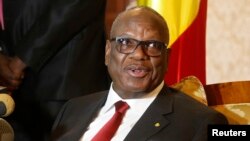DAKAR —
Mali's National Assembly is expected to discuss the creation of a Truth, Justice and Reconciliation Commission this week. Human rights groups have expressed concern that the proposed commission will not have the necessary independence to make a difference.
The new Mali is a work in progress. The crisis of 2012 and 2013 divided the country like never before, both literally and figuratively. French-led military intervention may have physically reunited much of the country early last year, but communal divisions are far from healed.
President Ibrahim Boubacar Keita said national reconciliation is a top priority but first Malians must figure out what exactly happened and why.
This week, the National Assembly will debate the legal framework to create a commission to do just that.
The proposed commission would have three years to explore crimes committed during this most recent crisis and during previous conflicts in the north. It would go back as far as independence in 1960.
A previous commission created last year by the former interim government accomplished little. Its failings left Malians doubting the very idea.
Human rights groups said this time the commission must be seen as impartial and representative.
Attorney Moctar Mariko is head of the Malian Association for Human Rights (AMDH).
He said the mandate of the commission needs to be clearly spelled out and the men and women who lead it cannot have been implicated in the crimes that were committed throughout the country. He said this commission must be "truly independent."
There is talk of attaching the commission to the relatively new Ministry of Reconciliation and Development for the North. Mariko says that's a bad idea as it would open the commission up to political interference.
The proposed commission would have 15 members and seven working groups.
International rights group, Human Rights Watch, said Malians should get a say in those appointed. The group said there should be wide consultation with civil society, political parties and other groups along with public confirmation hearings.
Human Rights Watch is also calling for the commission to have investigative powers that would allow it to refer cases to the criminal justice system and recommend reparations for victims.
The proposed commission would be called the Truth, Justice and Reconciliation Commission. Many Malians said it is exactly the order in which things must happen for this initiative to succeed. Truth, justice then reconciliation.
The new Mali is a work in progress. The crisis of 2012 and 2013 divided the country like never before, both literally and figuratively. French-led military intervention may have physically reunited much of the country early last year, but communal divisions are far from healed.
President Ibrahim Boubacar Keita said national reconciliation is a top priority but first Malians must figure out what exactly happened and why.
This week, the National Assembly will debate the legal framework to create a commission to do just that.
The proposed commission would have three years to explore crimes committed during this most recent crisis and during previous conflicts in the north. It would go back as far as independence in 1960.
A previous commission created last year by the former interim government accomplished little. Its failings left Malians doubting the very idea.
Human rights groups said this time the commission must be seen as impartial and representative.
Attorney Moctar Mariko is head of the Malian Association for Human Rights (AMDH).
He said the mandate of the commission needs to be clearly spelled out and the men and women who lead it cannot have been implicated in the crimes that were committed throughout the country. He said this commission must be "truly independent."
There is talk of attaching the commission to the relatively new Ministry of Reconciliation and Development for the North. Mariko says that's a bad idea as it would open the commission up to political interference.
The proposed commission would have 15 members and seven working groups.
International rights group, Human Rights Watch, said Malians should get a say in those appointed. The group said there should be wide consultation with civil society, political parties and other groups along with public confirmation hearings.
Human Rights Watch is also calling for the commission to have investigative powers that would allow it to refer cases to the criminal justice system and recommend reparations for victims.
The proposed commission would be called the Truth, Justice and Reconciliation Commission. Many Malians said it is exactly the order in which things must happen for this initiative to succeed. Truth, justice then reconciliation.




